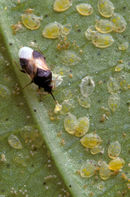Pest Management Science (2014) 70, 1655-1665
From Pestinfo-Wiki
 | Selected publication you are invited to contribute to the discussion section (above tab) |
Do plant trichomes cause more harm than good to predatory insects?
Pest Management Science 70 (11), 1655-1665
Abstract: Plants use trichomes as a morphological defense against attacks from herbivores. The literature was reviewed to test the hypothesis that trichome-bearing (pubescent) plants do not cause more harm than good to predators. Forty seven records on interactions between plant trichomes and predatory insects were found. Overall, the records reveal that trichomes have more harmful than beneficial effects on predators. Fortunately, most harmful effects are sublethal; they usually affect movement, development, oviposition and predation potential. In worst cases, sticky exudates from glandular trichomes entrap predators. The hooked tips on non-glandular trichomes impale predators. Entrapped and impaled predators often die from desiccation or starvation. Plant cultivars with high (rather than low) trichome density cause the most harm, and trichomes on tomato and some beans often cause more harm than good to predatory beetles, true bugs and lacewings. Whether these harmful effects have a net negative effect on plant fitness is poorly known and ripe for study. When developing and testing cultivars with increased trichome-based resistance to herbivory, the question as to whether these technologies are compatible with the functional role of those predators (single or combined species) capable of suppressing herbivore populations should be considered.
(The abstract is excluded from the Creative Commons licence and has been copied with permission by the publisher.)
Link to article at publishers website
Database assignments for author(s): Eric W. Riddick, Alvin M. Simmons
Research topic(s) for pests/diseases/weeds:
biocontrol - natural enemies
Research topic(s) for beneficials or antagonists:
general biology - morphology - evolution
Pest and/or beneficial records:
| Beneficial | Pest/Disease/Weed | Crop/Product | Country | Quarant. |
|---|